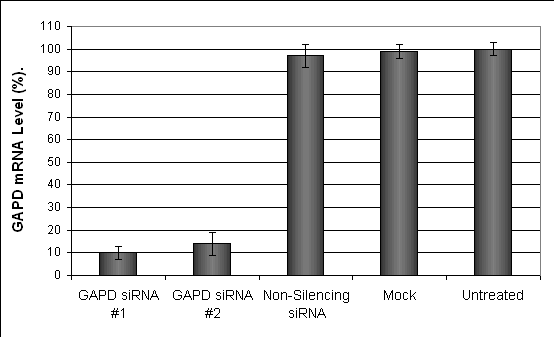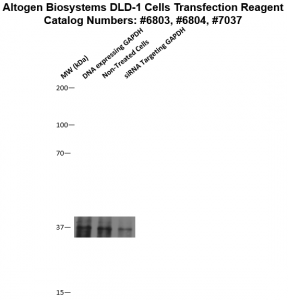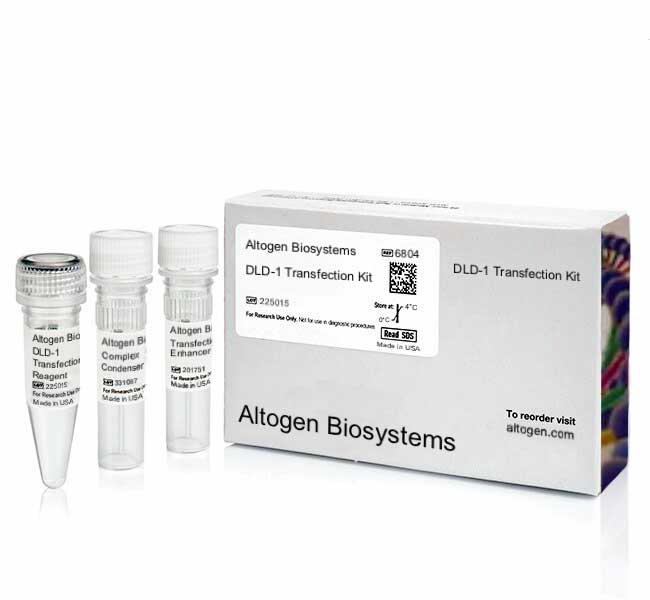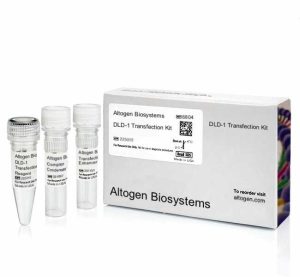Description
Purchase Orders: Click “Add to Cart” button to order, then email PO to orders@altogen.com.
Product Availability: In Stock.
Transfection Reagent for DLD-1 Cells (Colon Cancer Cells, CCL-221)
-
Two component formulation enhances lipid mediated transfection efficiency
-
Optimized easy-to-use transfection protocol provided for transfection of siRNA, DNA, mRNA, and miRNA
-
Kit includes Transfection Enhancer reagent and recommended transfection protocol
-
High transfection efficacy in the presence of serum
-
Expand your RNAi application with a reagent optimized for delivery of both siRNA and plasmid
-
Reproducible transfection results
-
Works well for standard reverse transfection and high-throughput applications
-
Download in vitro DLD-1 transfection protocol: [PDF]
- Download DLD-1 CRISPR/Cas9 transfection protocol: [PDF]
- Download PowerPoint presentation for DLD-1 cells transfection kit: [PPT]
- UPC/GTIN/EAN: 860002089758
-
Brand: ALTOGEN®, developed and manufactured by Altogen Biosystems
Transfection Efficiency:
Reagent exhibits at least 86% transfection efficiency of siRNA delivery. Transfection efficiency was determined by qRT-PCR.
Product Description:
Optimized transfection reagent for DLD-1 cells, provides high transfection efficiency and low cytotoxicity.
Transfection Protocol and SDS:
Download Altogen Biosystems DLD1 Transfection Protocol: [PDF]
Download SDS: [PDF]
DLD-1 Cell Line:
As per the National Cancer Institute, colon and rectal adenocarcinomas are the third most commonly detected malignancies in the United States, with the overall 5-year survival rate for advanced stage patients being approximately 11%. Although colorectal death rates are decreasing, due to the development of screening tests enabling early detection, it can be especially challenging to increase the survival rate in patients with late-stage colon cancer. Cell lines are at the core of cancer research, and the DLD-1 colorectal adenocarcinoma cell line is one of the most commonly employed colon cancer cell lines. It is well known for its ability to grow rapidly. The DLD-1 cell line was established in 1979 from the epithelial tumorigenic tissue of a Dukes’ type C tumor of an adult male patient with colorectal adenocarcinoma. DLD-1 is positive for myc, myb, ras, fos, sis, and p53 oncogenes and negative for ABL, ROS, and SRC oncogenes. This cell line could be used for research related to colon cancer cells. DLD-1 is of the same clonal origin as cell line HCT-15, making them similar to each other. Altogen Biosystems provides pre-optimized two-component transfection reagent kits for the DLD-1 colon cancer cell line. These reagents have demonstrated high transfection efficiency with reproducible results.
DLD1 is a human colorectal adenocarcinoma cell line that was originally derived from a 50-year-old female patient with colon cancer. The cells were isolated from a liver metastasis and have been used extensively in cancer research. The DLD1 cell line is commonly used as a model system to study various aspects of colorectal cancer biology, including cell proliferation, apoptosis, and chemoresistance. These cells exhibit many characteristics of cancer cells, including aneuploidy, chromosomal instability, and a high rate of mutation.
Data:

Figure 1. GAPD mRNA levels were quantified using real-time RT-PCR in the DLD-1 cells transfected with siRNAs targeting GAPD or non-silencing siRNA. Forty-eight hours post-transfection, the cells were harvested and analyzed by real-time RT-PCR for GAPD mRNA expression levels. Data were normalized against the 18S rRNA signal. Control samples were either mock-transfected or untreated. Values are normalized to untreated sample. Data are means ± SD (n=5).

Figure 2. Protein expression of GAPDH in DLD-1 cells. DNA plasmid expressing GAPDH or siRNA targeting GAPDH were transfected into DLD-1 cells following Altogen Biosystems transfection protocol. At 72 hours post-transfection the cells were analyzed by Western Blot for protein expression levels (normalized by total protein, 10 µg of total protein loaded per each well). Untreated cells used as a negative control.
Altogen Biosystems is a life sciences company that offers cell type-specific and pre-optimized transfection products, elecroporation kits, and in vivo delivery reagents. Advanced formulation of reagents and optimized transfection protocols provide efficient intracellular delivery of protein, DNA, mRNA, shRNA and siRNA molecules. Read more about transfection technology at Altogen’s Transfection Resource. Altogen Labs provides safety and efficacy preclinical research services. GLP-compliant studies for IND applications, and drug development, including over 90 in-house validated xenograft models, safety toxicology, etc (visit AltogenLabs.com).
Volume Options:
- 0.5 ml (Catalog #6803)
- 1.5 ml (Catalog #6804)
- 1.5 ml CRISPR (Catalog #2139)
- 8.0 ml (Catalog #7037)
Purchase Orders: Click “Add to Cart” button to order, then email PO to orders@altogen.com.
Product Availability: In Stock.






